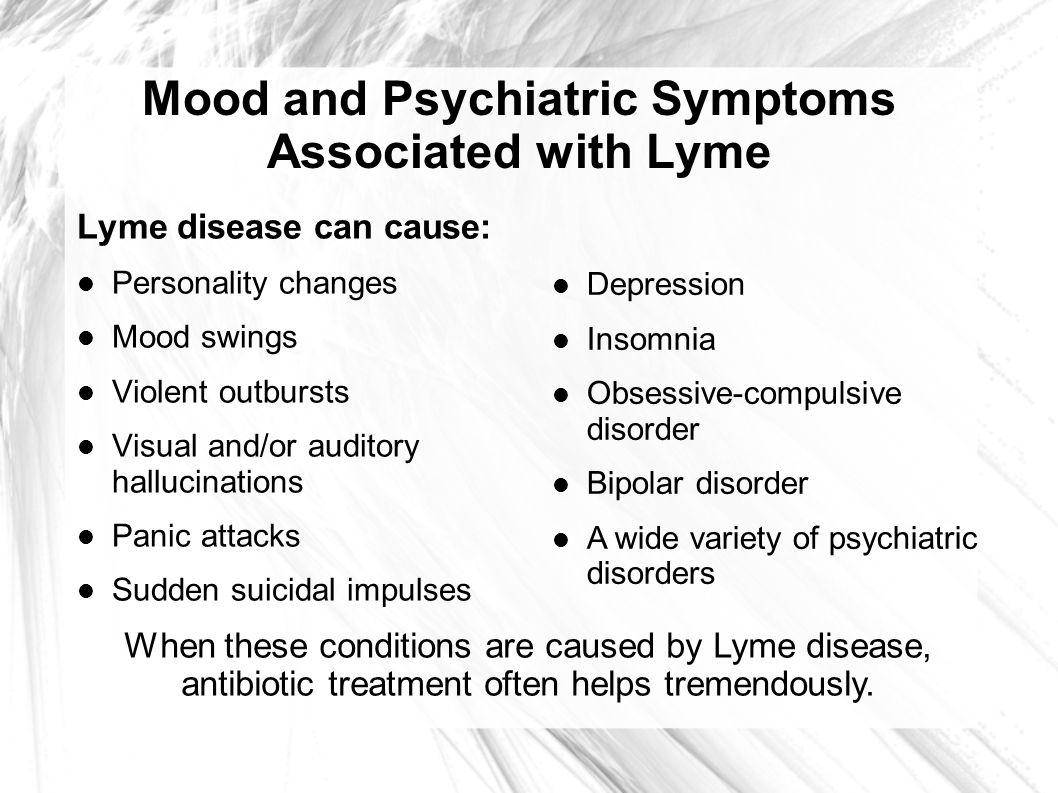After treating thousands of patients with tick-borne disease in the past 20 years it appears psychiatric symptoms are more commonly seen when there is a co-infection explains psychiatrist Robert Bransfield MD president of the International Lyme and Associated Diseases Society ILADS and vice president of the New Jersey Psychiatric Association. Patients with Lyme and related tick-borne diseases can have symptoms which mimic every known psychiatric syndrome.
 Tick Borne Diseases And Associated Diseases Ppt Download
Tick Borne Diseases And Associated Diseases Ppt Download
Fewer will focus on the enduring medical legal and.

Psychiatric symptoms of lyme disease. My neuro-psychiatric symptoms responded to treatment with antibiotics. One study found Lyme encephalopathy in children presented with memory impairment irritability and somnolence months to years after the initial classical presentation of Lyme disease. These symptoms include insomnia anxiety brain fog obsessive-compulsive symptoms depersonalization depression and rages.
I was diagnosed with a stress related disorder later depression and then a classic psychiatric disease before Lyme disease was diagnosed. Lyme patients tend to have trouble with mood regulation cognition energy sensory processing andor sleep. For over 30 years he has treated Lyme patients who have psychiatric symptoms.
Symptoms of neurological Lyme disease and other tick-borne infections. Treatment aimed directly at symptoms can relieve suffering rather quickly. Consider Lyme disease in children with behavioral changes fatigue school phobias academic problems learning disabilities headaches sore throats GI complaints andor.
Depressive states among patients with late Lyme disease are fairly common ranging across studies from 26 to 66. Lyme disease and autism not only share numerous similarities with regard to psychiatric symptoms and syndromes but also autoimmunity. Patients with Lyme and related tick-borne disease can have symptoms which mimic every known psychiatric syndrome.
In some people Lyme disease can also cause paranoia mania obsessive compulsive tendencies anxiety. All of the neuropsychiatric issues mentioned above are considered symptoms of Lyme disease. This can manifest into paranoia.
Some focus on the medical signs symptoms and implications of Lyme the classic bullseye rash stiff joints fatigue headaches and so on. One of the best indicators that the problem is Lyme Disease is the distinctive rash that is caused by the tick bite. Together with the rise of complex chronic illnesses caused by stealth pathogens we witness a rise of the invention of so-called somatic.
While no formal statistics are kept on what contributes to the 45000 suicides per year in the United States he estimates that some 1200 are likely attributable to depression and other brain manifestations that can result from chronic Lyme disease. Psychiatric Symptoms of Lyme Disease. Caused by the bacteria Borrelia burgdorferi the early signs and symptoms of Lyme Disease include fever chills headache fatigue muscle and joint pain and swollen lymph nodes.
The most common symptom is cognitive difficulties or brain fog But also very common is anxiety sometimes with panic attacks or a feeling of not being quite real This is incredibly distressing and difficult to describe. In fact 70 of people with Lyme disease say they experience negative changes in memory and mental sharpness. It is curious then that medical doctors who suspect syphilis infections likely would regard mental illness-type symptoms as evidence of syphilis infection whereas a great many medical professionals who see patients who suspect they may have Lyme disease instead regard mental illness-type symptoms as evidence that the patient has no physical illness at all.
Lyme disease is a multisystem illness that may affect the central nervous system and subsequently produce mild to severe psychiatric disorders. People often think they have the flu. The number of studies linking both Lyme disease and autism to autoimmune dysfunction is vast encompassing dozens of published articles released by.
Neuropsychiatric symptoms may be the first symptom recognized or can surface months or years later. Physicians who treat patient with Lyme disease need to be aware of its neuropsychiatric symptoms which may emerge months to years after the initial infection. Neurological Lyme disease often begins with nerve pain that can start in the back and radiate down to the legs.
Neuropsychiatric symptoms are prominent. This can develop into weakness numbness or tingling in the lower extremities over time. LB causes immune and metabolic effects that result in a gradually developing spectrum of neuropsychiatric symptoms usually presenting with significant comorbidity which may include developmental disorders autism spectrum disorders schizoaffective disorders bipolar disorder depression anxiety disorders panic disorder social anxiety disorder generalized anxiety disorder posttraumatic stress disorder intrusive symptoms eating disorders decreased libido sleep disorders addiction.
A broad range of psychiatric reactions have been associated with Lyme disease including paranoia dementia schizophrenia bipolar disorder panic attacks major depression anorexia nervosa and obsessive-compulsive disorder.
